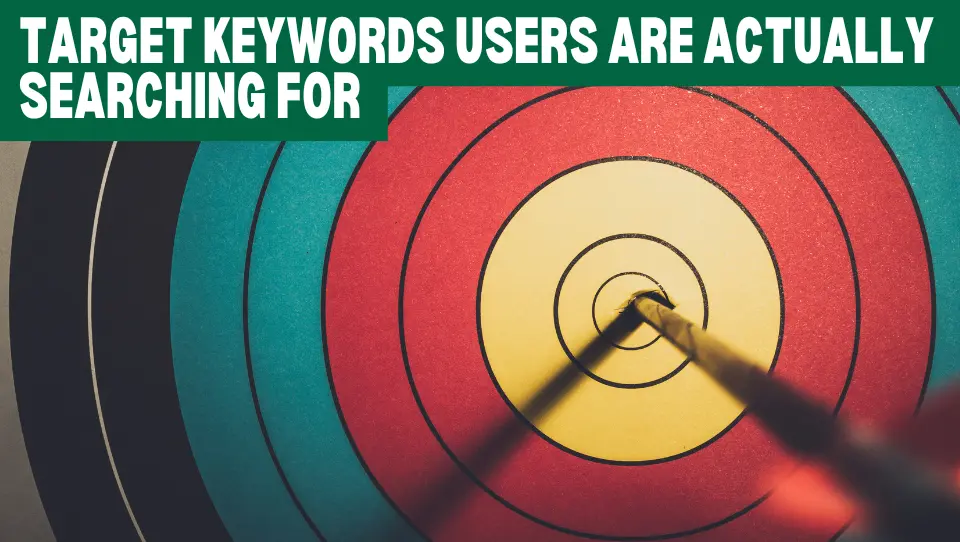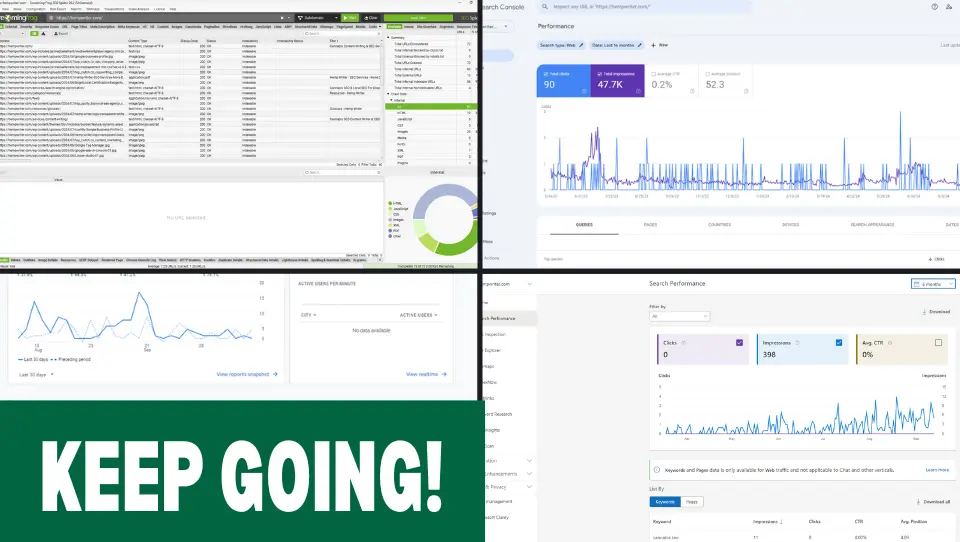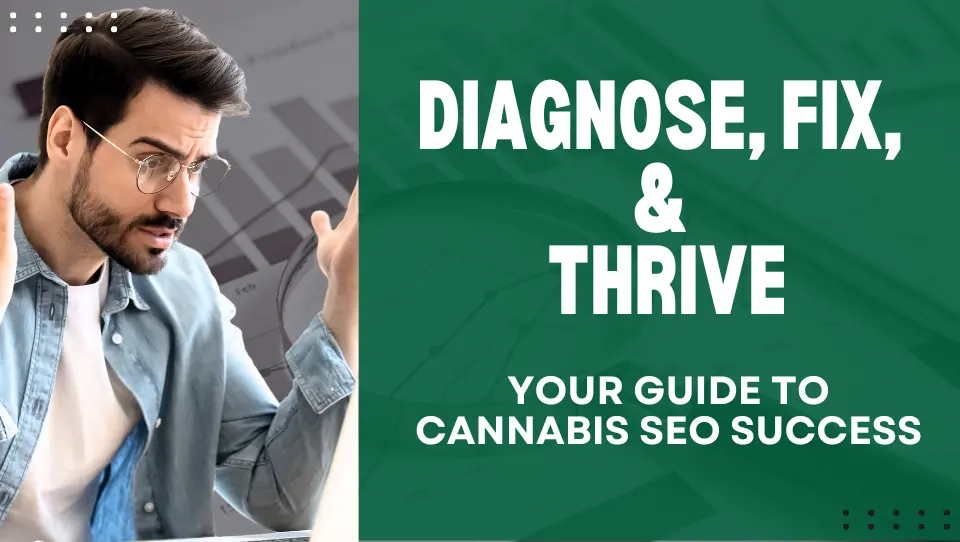Feeling Lost In The Weeds Of SEO For Your Cannabis Business?
Did you know that over 53.3% of all website traffic comes from organic searches (BrightEdge)?
That’s a massive pool of potential clients actively searching for cannabis products and services online.
The key to successful SEO is using the keywords your target audience is actually searching for.
This will vary depending on your specific niche within the cannabis industry.
But, ranking high in search results requires a well-crafted SEO strategy.
In the competitive cannabis industry, high search rankings are essential for all players, from dispensaries seeking local customers to growers cultivating premium strains and processors crafting innovative products.
This drives organic sales and builds brand recognition.
This guide will help you troubleshoot common SEO roadblocks and get your website on the track to organic success, specifically tailored to the unique needs of various cannabis business sub-niches.
Get your website on the track to organic success, specifically in the competitive cannabis niche.
Even though SEO takes time and expertise, there’s a path forward.
Today, we will explore common reasons why SEO might be stalling and offer actionable steps to get your website back on track.
From identifying keyword issues to addressing technical problems, we’ll equip you to troubleshoot and optimize your SEO strategy for long-term success.
Remember, SEO is a journey, not a destination.
Let’s get you moving in the right direction!
The Power Of SEO & Why It Matters
While ranking high in search results is essential for online visibility, SEO offers a treasure trove of benefits specifically tailored to cannabis businesses.
Imagine this.
Over half (53.3%) of all website traffic comes from people actively searching for solutions online.
That’s a massive pool of potential customers who are already primed to engage with your business.
This is where SEO comes in.
By implementing effective SEO strategies, you can increase your website’s visibility in search engine results pages (SERPs), putting your business directly in front of this highly motivated audience.
Here’s how our Cannabis SEO services can help you achieve this.
Traffic Surge
Our data-driven approach to keyword research and optimization ensures your website ranks for relevant searches, driving a significant increase in organic traffic.
Imagine a scenario where you go from relying solely on social media (which generates 1,000% less traffic according to studies) to attracting a steady stream of qualified leads through organic searches.
When conducting keyword research, dispensaries should focus on location-specific terms with high purchase intent.
Look for keywords like ‘best dispensary near me’ or ‘buy cannabis [city, state]’.
You can also target long-tail keywords that address specific customer needs, such as ‘cannabis for pain relief’ or ‘edibles for anxiety’.
In contrast, growers and processors might target keywords related to specific strains, cultivation techniques, or the products they produce.
Research keywords like ‘[strain name] for sale’ or ‘high CBD flower’.
Additionally, target informative keywords that answer common grower questions, like ‘how to cure cannabis’ or ‘best lights for indoor growing’.
Quality Leads, Higher Conversions
SEO attracts users who are actively looking for the products or services you offer.
Studies show that leads generated through SEO have a much higher close rate (14.6%) compared to other channels.
Our SEO strategies will help you target the right audience, leading to more website conversions and ultimately, increased sales.
Dominate Search Results
Ranking on the first page of search results is crucial.
Statistics show that the top three results capture over 54% of all clicks.
Our SEO services will help you outrank competitors and secure those coveted top positions, leading to significantly higher website visibility and brand awareness.
Long-Term Growth
SEO is an investment that pays off in the long run.
Studies indicate that the top-ranking pages on Google tend to be well-established, with an average age of 3 years.
Our SEO strategies are designed for long-term success, ensuring your website continues to rank high and attract organic traffic for years to come.
Beyond The Numbers: The SEO Advantage
While the statistics paint a compelling picture, SEO offers even more advantages:
- Build Trust and Credibility: High search rankings are seen as a mark of authority and trust. By ranking well, you establish yourself as a leader in your industry, giving potential customers confidence in your brand.
- Cost-Effective Marketing: Compared to paid advertising, SEO delivers long-term organic traffic growth without the need for ongoing investment. This makes SEO a highly cost-effective way to reach your target audience.
- Targeted Audience: SEO allows you to target users who are actively searching for what you offer. This laser focus ensures you’re attracting the right people, maximizing your return on investment.
By leveraging our SEO expertise or DIY, you can unlock the immense potential of organic search and achieve sustainable growth for your business.
Now, let’s dive into the actual strategy and specific tactics you can use to help you solve the issue of SEO not working like you’d hoped it would.

Diagnose, Fix, & Thrive
Before you can fix any issue with SEO, you first need to figure out exactly what’s causing your issue.
Once you have a solid understanding of what’s causing your specific problem, you can then take the necessary consistent action to build long-term thriving results.
Here’s a breakdown of the key steps to fixing your SEO when it stops working.
Diagnosis
- Analyze Your Data: Look at website traffic, conversions, keyword performance, and content engagement to identify areas for improvement.
- Identify Potential Issues: Consider keyword targeting, content quality, technical SEO problems, and lack of backlinks.
Fixing
- Refine Keyword Strategy: Research long-tail keywords with lower competition and higher relevance.
- Optimize Content: Improve existing content and create new content addressing user needs.
- Improve Website Performance: Address technical SEO issues for a mobile-friendly, fast-loading, and crawlable website.
- Build Backlinks: Acquire backlinks from high-authority websites in your niche.
Long-Term Success
- Focus on Long-Term SEO: SEO is an ongoing process requiring consistent effort and optimization.
- Content is King: Create high-quality, informative content that engages your target audience.
- Communication is Key: Be transparent with clients about challenges and progress with data-driven reporting.
By following these steps, you can improve your website’s ranking, organic traffic, and lead generation through SEO.
Hold on before you hit the SEO panic button and write it off!
While we’ll get into specific steps to fix any SEO roadblocks you’re facing, let’s take a step back first.
Understanding the immense potential of SEO can reignite your motivation and guide your efforts toward long-term success.
So, before we dive into the weeds, let’s explore what SEO is truly capable of achieving.

Diagnose What’s Broken?
Before you can confidently say that SEO isn’t working, one strategy you may consider is to take a step back and reevaluate what you actually want to achieve with SEO.
From various sources across expert SEO channels, the top reasons why SEO isn’t working include.
- Unrealistic Expectations & Lack of Patience
- Missing the Mark on Strategy and Planning
- Content & Technical Issues
- Off-Page SEO & Promotion
- Investment & Time Commitment
- Website & User Experience
- Fundamental Business Considerations
- Tracking & Measurement
1. Unrealistic Expectations & Lack of Patience
Expecting quick SEO wins is a recipe for disappointment. SEO is a marathon, not a sprint. It requires consistent effort and ongoing optimization to see significant results.
Not giving your SEO strategy enough time to work its magic is a common mistake.
2. Missing the Mark on Strategy and Planning
Lack of a clear SEO strategy can leave you directionless and hinder progress.
Not understanding your target audience and their search intent can lead to content that misses the mark.
Ignoring the competitive landscape can make it difficult to rank for relevant keywords.
3. Content & Technical Issues
Low-quality, poorly written content that doesn’t address user needs won’t attract organic traffic.
Content that doesn’t align with search intent (what users are actually looking for) will struggle to rank well.
Technical problems like slow loading speeds, mobile-unfriendliness, and crawl errors can prevent search engines from properly indexing your website.
4. Off-Page SEO & Promotion
A lack of high-quality backlinks from relevant websites can negatively impact your SEO.
Not actively promoting your content and building backlinks makes it harder for search engines to discover your website.
Not utilizing schema markup can limit the information search engines understand about your content.
5. Investment & Time Commitment
SEO requires an ongoing investment of time and resources.
Without this commitment, it’s difficult to achieve long-term success.
Ignoring obvious technical issues on your website can significantly hinder SEO performance.
6. Website & User Experience
Poor website architecture and navigation can make it difficult for users and search engines to find relevant content.
A bad user experience (UX) with slow loading times and confusing interfaces will discourage visitors and hurt SEO.
7. Fundamental Business Considerations
Before investing heavily in SEO, consider if there’s sufficient search demand for your product or service.
Resource: SEO ROI – Calculator
Glossary Of SEO & Fundamental Business Terms
If your target audience doesn’t use search engines to find similar solutions, SEO might not be the most effective strategy.
8. Tracking & Measurement
Not tracking conversions and website analytics makes it impossible to measure SEO success and identify areas for improvement.

Common Reasons Why SEO Might Not Be Working
Investing time and effort into SEO but not seeing the results you expected?
This can be frustrating, but don’t despair!
Here’s a breakdown of some common reasons why your SEO strategy might be stalling, along with actionable steps to get your website back on the search engine optimization fast track.
Misaligned Keyword Targeting Strategy
It might be a keyword issue.
Are you targeting words with little search volume, or missing the long-tail keywords that convert?
Even worse, are you overlooking what users are actually looking for?
Don’t worry!
By reevaluating your keywords to reflect search intent and audience needs, you can unlock a treasure trove of SEO potential.
Content Issues: Fix Your Content For SEO Success
Is your content calendar collecting dust?
Thin, uninformative content is a major SEO turn-off.
Here’s how to revitalize your content strategy:
- Craft high-quality, informative articles: Focus on in-depth topics relevant to your target audience. Think valuable guides, industry insights, or answer user questions directly.
- Optimize for target keywords: Integrate your target keywords naturally throughout the content, but prioritize readability – keyword stuffing hurts!
- Embrace long-tail keywords: Target specific, longer keyword phrases with lower competition but higher conversion rates.
Dispensaries can create informative blog posts on various cannabis topics, such as ‘What are terpenes?’ or ‘A guide to different cannabis consumption methods.’
Offer educational resources for new cannabis users and highlight the unique products and services your dispensary provides.
Growers can establish themselves as an industry thought leader by creating informative content about cultivation techniques, best practices, and new advancements in cannabis growing.
You can also share case studies about your own successful grows or partner with other growers for guest blog posts.
By creating valuable, keyword-rich content, you’ll attract both users and search engines.
On-Page Optimization Obstacles: Streamline Your Website
Is your website a labyrinth?
Confusing navigation and poor on-page optimization can cripple your SEO.
Here’s how to streamline your site:
- Simplify website structure: Ensure a clear, logical flow for users to navigate your website and find information easily.
- Optimize title tags & meta descriptions: Craft compelling titles and descriptions that accurately reflect your content and entice users to click.
- Target keywords in headers: Use relevant keywords in H1, H2, and H3 tags to structure your content and signal relevance to search engines.
- Prioritize mobile-friendliness: With most searches happening on mobile devices, ensure your website displays flawlessly on all screen sizes.
- Speed things up: Optimize website images and code for faster loading times. User experience and SEO both benefit from a speedy site!
Dispensaries can optimize product pages with detailed descriptions, including information about terpene profiles, effects, and recommended uses.
This caters to customers who are already familiar with cannabis products and are looking for specific information to make a purchase decision.
Processors should optimize their website content to target customers who are interested in the science and innovation behind cannabis products.
Include blog posts about extraction methods, different cannabinoids, and the benefits of specific cannabis products.
By focusing on user experience and clear page structure, you’ll improve both SEO and user engagement.
Technical SEO Troubles: Unclog The Pipes Of Your Website
Is your website invisible to search engines?
Technical SEO issues can prevent search engines from crawling and indexing your website.
Here’s how to clear the cobwebs:
- Conquer crawl errors: Use website auditing tools to identify crawl errors that prevent search engines from accessing your content. Fix these errors to ensure your website gets seen.
- Fortify your website security: Maintain a secure website to avoid search engine penalties and user distrust. Invest in an SSL certificate and keep website software updated.
- Embrace structured data markup: Implement structured data markup to provide search engines with richer information about your content. This can lead to more informative search results and potentially attract more clicks.
By addressing technical SEO issues, you ensure search engines can easily understand and index your website, boosting your visibility.
Off-Page Optimization: Build Your Backlink Authority
Is your website an island in the digital sea?
A lack of backlinks, links from other websites to yours, can hinder your SEO efforts.
Here’s how to build authority:
- Earn high-quality backlinks: Focus on acquiring backlinks from reputable websites relevant to your industry. Guest blogging, creating link-worthy content, and online community participation are great strategies.
- Beware of negative SEO: Unethical competitors might try to harm your website through negative SEO tactics. Regularly monitor your backlink profile and disavow any suspicious links.
By building a strong backlink profile with high-authority websites, you demonstrate trust and relevance to search engines, improving your ranking potential.
Unrealistic SEO Expectations: Patience Is A Virtue
Feeling discouraged by slow SEO progress?
SEO is a marathon, not a sprint.
Here’s how to adjust your expectations:
- SEO takes time: Don’t expect overnight results. Consistent effort and ongoing optimization are key to long-term success.
- Monitor and adapt: Regularly monitor your website traffic, rankings, and SEO performance. Use data to identify areas for improvement and adapt your strategy accordingly.
- Embrace the journey: SEO is an ongoing process that requires continuous learning and adaptation. Stay up-to-date with the latest SEO trends and algorithm updates.
By adopting realistic expectations and a commitment to continuous improvement, you’ll be well on your way to achieving sustainable SEO success.

Fix: What To Do When You Identify Issues?
Conduct A Comprehensive SEO Audit
Invest in a thorough SEO audit using website auditing tools or consider professional services.
This audit will provide a detailed report outlining technical issues, content weaknesses, and backlink profile analysis.
Prioritize And Address Critical Issues First
The audit will likely reveal a range of problems.
Don’t try to fix everything at once!
Analyze the issues and prioritize the most critical ones that will have the biggest impact on your SEO performance.
Focus on technical issues like crawl errors that can significantly hinder indexing or low-hanging fruit like optimizing title tags.
Develop A Content Creation And Optimization Strategy
Great content is the cornerstone of SEO success.
Based on your keyword research and audit findings, develop a content strategy that targets relevant keywords, creates informative and engaging content, and optimizes existing content for better ranking.
Focus On Building High-Quality Backlinks
Earning backlinks from reputable websites in the cannabis industry is crucial for boosting your authority and ranking.
Explore guest blogging opportunities, create link-worthy content like infographics, or participate in relevant online communities to build natural backlinks.
Monitor Progress And Adjust Your Strategy Based On Data
SEO is an ongoing process.
Regularly track your website traffic, keyword rankings, and backlink profile using analytics tools.
Use this data to identify areas for improvement, track the effectiveness of your efforts, and adjust your SEO strategy for continuous optimization.
By following these steps and remaining data-driven, you can effectively troubleshoot your SEO weaknesses and get your website back on the path to ranking success.

Final Thoughts: SEO Is A Journey, Not A Destination
Feeling overwhelmed by SEO?
Remember, SEO is a marathon, not a sprint.
By following the steps outlined in this post, you can identify and address common SEO roadblocks, develop a data-driven strategy, and create valuable content that attracts users and search engines alike.
Here’s a quick recap:
- Conduct a comprehensive SEO audit to diagnose issues.
- Prioritize critical issues and address them strategically.
- Develop a content creation and optimization plan.
- Focus on building high-quality backlinks for authority.
- Monitor progress and adapt your strategy based on data.
- Stay up-to-date with SEO trends and create user-centric content.
- Embrace patience and persistence for long-term SEO success.
Still feeling lost?
Don’t hesitate to invest in professional SEO services!
Partnering with an experienced SEO specialist can help you navigate the complexities of SEO and achieve your online visibility goals.
For the DIY enthusiast, numerous resources are available to help you on your SEO journey.
Explore online SEO tools, educational blog posts, and industry publications to deepen your SEO knowledge.
Remember, consistent effort and a commitment to continuous improvement are key to unlocking the full potential of SEO and driving organic cannabis leads to your website.
Now go forth and conquer the search engine landscape!

Bonus
When SEO isn’t generating the results you expect, it’s important to diagnose the problem and take corrective action.
Here’s a breakdown of steps you can take:
Analyze Your Data
- Traffic & Conversions: Start by analyzing website traffic data using tools like Google Search Console and Google Analytics. Look for trends in organic traffic, bounce rates, and conversion rates (e.g., contact form submissions).
- Keyword Performance: See which keywords are driving traffic and identify any ranking fluctuations. Are they relevant to your target audience and business goals?
- Content Performance: Analyze which blog posts and website content perform well in terms of traffic, engagement (shares, comments), and conversions.
Identify Potential Issues
- Keyword Targeting: Your keywords might be too competitive, not specific enough to your niche, or not relevant to your ideal customer’s search intent.
- Content Quality: The content might be poorly written, lack depth or valuable insights, or fail to address the specific needs of your target audience.
- Technical SEO: Technical issues like slow loading speed, mobile-friendliness problems, or website crawlability issues can hinder SEO performance.
- Off-Page SEO: Your website might lack high-quality backlinks from reputable websites in the cannabis industry.
Take Action to Improve SEO
- Refine Keyword Strategy: Research long-tail keywords with lower competition but higher conversion potential. Focus on keywords specific to cannabis products and services in your local area.
- Optimize Content: Improve existing content based on data and user engagement. Create new content that directly addresses the pain points and challenges faced by cannabis clients.
- Improve Website Performance: Address any technical SEO issues to ensure your website is mobile-friendly, loads quickly, and can be easily crawled by search engines.
- Build Backlinks: Develop a link-building strategy to acquire backlinks from high-authority websites in the cannabis niche or local business directories.
Focus on Long-Term SEO
- SEO is a marathon, not a sprint. Consistent effort and ongoing optimization are essential to see significant and sustainable results.
- Content is king. High-quality, informative content that engages your target audience remains a cornerstone of successful SEO.
Communication is Key
- If you’re managing SEO for a client, be transparent about the challenges and explain the adjustments you’re making.
- Regularly share website traffic data, keyword rankings, and other relevant SEO metrics to demonstrate progress.
By following these steps, you can identify the reasons behind underperforming SEO and implement a data-driven strategy to improve website ranking, organic traffic generation, and ultimately, qualified leads for your cannabis client.

